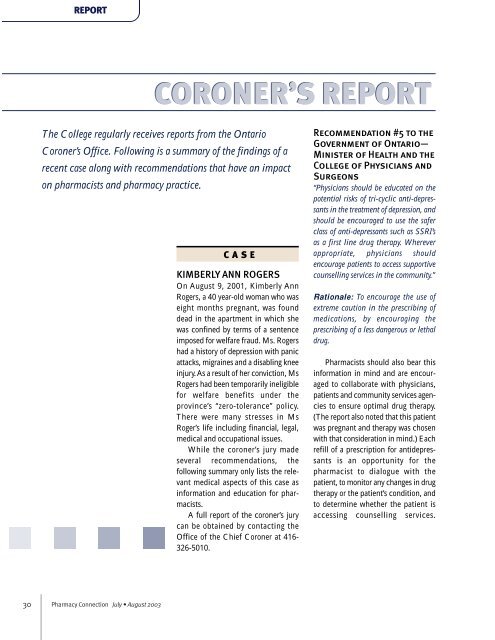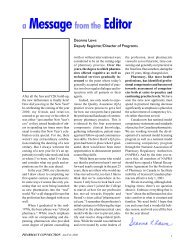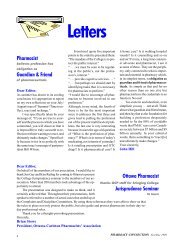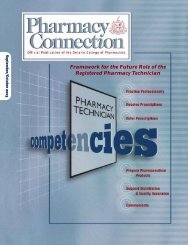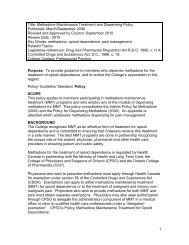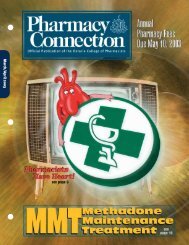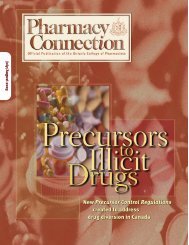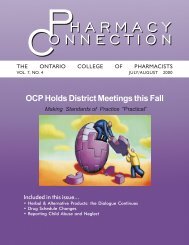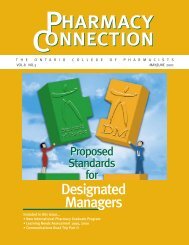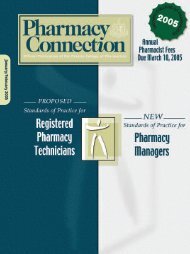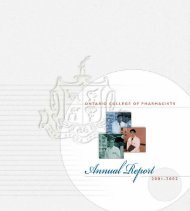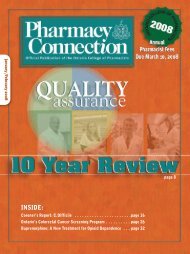July ⢠August 2003 - Ontario College of Pharmacists
July ⢠August 2003 - Ontario College of Pharmacists
July ⢠August 2003 - Ontario College of Pharmacists
Create successful ePaper yourself
Turn your PDF publications into a flip-book with our unique Google optimized e-Paper software.
REPORT<br />
CORONER’S REPORT<br />
CORONER’S REPORT<br />
The <strong>College</strong> regularly receives reports from the <strong>Ontario</strong><br />
Coroner’s Office. Following is a summary <strong>of</strong> the findings <strong>of</strong> a<br />
recent case along with recommendations that have an impact<br />
on pharmacists and pharmacy practice.<br />
CASE<br />
KIMBERLY ANN ROGERS<br />
On <strong>August</strong> 9, 2001, Kimberly Ann<br />
Rogers, a 40 year-old woman who was<br />
eight months pregnant, was found<br />
dead in the apartment in which she<br />
was confined by terms <strong>of</strong> a sentence<br />
imposed for welfare fraud. Ms. Rogers<br />
had a history <strong>of</strong> depression with panic<br />
attacks, migraines and a disabling knee<br />
injury. As a result <strong>of</strong> her conviction, Ms<br />
Rogers had been temporarily ineligible<br />
for welfare benefits under the<br />
province’s “zero-tolerance” policy.<br />
There were many stresses in Ms<br />
Roger’s life including financial, legal,<br />
medical and occupational issues.<br />
While the coroner’s jury made<br />
several recommendations, the<br />
following summary only lists the relevant<br />
medical aspects <strong>of</strong> this case as<br />
information and education for pharmacists.<br />
A full report <strong>of</strong> the coroner’s jury<br />
can be obtained by contacting the<br />
Office <strong>of</strong> the Chief Coroner at 416-<br />
326-5010.<br />
Recommendation #5 to the<br />
Government <strong>of</strong> <strong>Ontario</strong>—<br />
Minister <strong>of</strong> Health and the<br />
<strong>College</strong> <strong>of</strong> Physicians and<br />
Surgeons<br />
“Physicians should be educated on the<br />
potential risks <strong>of</strong> tri-cyclic anti-depressants<br />
in the treatment <strong>of</strong> depression, and<br />
should be encouraged to use the safer<br />
class <strong>of</strong> anti-depressants such as SSRI’s<br />
as a first line drug therapy. Wherever<br />
appropriate, physicians should<br />
encourage patients to access supportive<br />
counselling services in the community.”<br />
Rationale: To encourage the use <strong>of</strong><br />
extreme caution in the prescribing <strong>of</strong><br />
medications, by encouraging the<br />
prescribing <strong>of</strong> a less dangerous or lethal<br />
drug.<br />
<strong>Pharmacists</strong> should also bear this<br />
information in mind and are encouraged<br />
to collaborate with physicians,<br />
patients and community services agencies<br />
to ensure optimal drug therapy.<br />
(The report also noted that this patient<br />
was pregnant and therapy was chosen<br />
with that consideration in mind.) Each<br />
refill <strong>of</strong> a prescription for antidepressants<br />
is an opportunity for the<br />
pharmacist to dialogue with the<br />
patient, to monitor any changes in drug<br />
therapy or the patient’s condition, and<br />
to determine whether the patient is<br />
accessing counselling services.<br />
30<br />
Pharmacy Connection <strong>July</strong> • <strong>August</strong> <strong>2003</strong>


